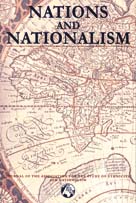Crossref Citations
This article has been cited by the following publications. This list is generated based on data provided by
Crossref.
Mollov, Ben
and
Lavie, Chaim
2001.
CULTURE, DIALOGUE, AND PERCEPTION CHANGE IN THE ISRAELI‐PALESTINIAN CONFLICT.
International Journal of Conflict Management,
Vol. 12,
Issue. 1,
p.
69.
Fox, Jonathan
2001.
Clash of Civilizations or Clash of Religions.
Ethnicities,
Vol. 1,
Issue. 3,
p.
295.
Fox, Jonathan
2002.
In the Name of God and Nation: The Overlapping Influence of Separatism and Religion on Ethnic Conflict.
Social Identities,
Vol. 8,
Issue. 3,
p.
439.
Rynhold, Jonathan
2003.
Religion: Part of the Problem or Part of the Solution?.
International Studies Review,
Vol. 5,
Issue. 2,
p.
242.
Willems, Ulrich
and
Minkenberg, Michael
2003.
Politik und Religion.
p.
13.
Fox, Jonathan
2004.
Religion and State Failure: An Examinationof the Extent and Magnitude of Religiousconflict from 1950 to 1996.
International Political Science Review,
Vol. 25,
Issue. 1,
p.
55.
Commuri, Gitika
2009.
The Relevance of National Identity Narratives in Shaping Foreign Policy.
Journal of South Asian Development,
Vol. 4,
Issue. 2,
p.
161.
Evans, Jocelyn
and
Tonge, Jonathan
2013.
Catholic, Irish and Nationalist: evaluating the importance of ethno‐national and ethno‐religious variables in determining nationalist political allegiance in Northern Ireland.
Nations and Nationalism,
Vol. 19,
Issue. 2,
p.
357.
Rakodi, Carole
2013.
Inter-Religious Violence and its Aftermath: Insights from Indian and Nigerian Cities.
Journal of Asian and African Studies,
Vol. 48,
Issue. 5,
p.
557.
Ewane, Etah Fidelis
2014.
Rwanda Redux: The Latent Genocide in the Central African Republic and the Failure to Protect.
SSRN Electronic Journal,
Olomojobi, Yinka
2016.
Religious Primordialism, Nationalism & Identity.
SSRN Electronic Journal,
Mollov, Ben
and
Lavie, Chaim
2016.
Promoting Global Peace and Civic Engagement through Education.
p.
166.
Bodnaruk Jazayeri, Karen
2016.
Identity-based political inequality and protest: The dynamic relationship between political power and protest in the Middle East and North Africa.
Conflict Management and Peace Science,
Vol. 33,
Issue. 4,
p.
400.
Burchardt, Marian
and
Hovhannisyan, Hovhannes
2016.
Religious vs secular nationhood: ‘Multiple secularities’ in post-Soviet Armenia.
Social Compass,
Vol. 63,
Issue. 4,
p.
427.
Olomojobi, Yinka
2017.
Explaining the Osmosis of Identity Threats and Religious Violence.
SSRN Electronic Journal,
Michael Kpughe, Lang
2017.
Christian Churches and the Boko Haram Insurgency in Cameroon: Dilemmas and Responses.
Religions,
Vol. 8,
Issue. 8,
p.
143.
Khatib, Ibrahim
Canetti, Daphna
and
Rubin, Aviad
2018.
Conflict perception: a new scale with evidence from Israel and Palestine.
International Journal of Conflict Management,
Vol. 29,
Issue. 3,
p.
376.
Subotić, Milovan
and
Mitrović, Miroslav
2018.
Hybrid nature of extremism: Cohesive characteristics of ethno-nationalism and religious extremism as generators of Balkan insecurity.
Vojno delo,
Vol. 70,
Issue. 1,
p.
22.
Mollov, Ben
and
Lavie, Chaim
2019.
Intercultural and Interfaith Dialogues for Global Peacebuilding and Stability.
p.
230.
Ellis, Donald G.
2019.
Building a theory of communication and ethnopolitical conflict.
Communication Monographs,
Vol. 86,
Issue. 1,
p.
68.




